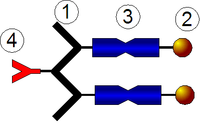
Photo from wikipedia
There are many proteins and enzymes in the human body, and their dysfunction can lead to disease. The use of proteins as a drug is common in various diseases such… Click to show full abstract
There are many proteins and enzymes in the human body, and their dysfunction can lead to disease. The use of proteins as a drug is common in various diseases such as diabetes. Proteins are hydrophilic molecules whose spatial structure is critical to their correct function. There are different ways to the administration of proteins. Protein structures are degraded by gastric acid and enzymes in the gastrointestinal tract and have a slight ability to permeation from the gastrointestinal epithelium due to their large hydrophilic nature. Therefore, their oral use has limitations. Since the oral use of drugs is one of the best and easiest routes for patients, many studies have been done to increase the stability, penetration and ultimately increase the bioavailability of proteins through oral administration. One of the studied strategies for oral delivery of protein is the use of pH-sensitive polymer-based carriers. These carriers use different pH-sensitive polymers such as eudragit®, chitosan, dextran, and alginate. The use of pH-sensitive polymer-based carriers by protecting the protein from stomach acid (low pH) and degrading enzymes, increasing permeability, and maintaining the spatial structure of the protein leads to increased bioavailability. In this review, we focus on the various polymers used to prepare pH-sensitive polymer-based carriers for the oral delivery of proteins.
Journal Title: Protein and peptide letters
Year Published: 2021
Link to full text (if available)
Share on Social Media: Sign Up to like & get
recommendations!